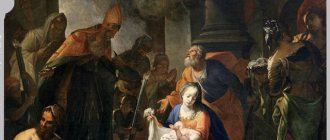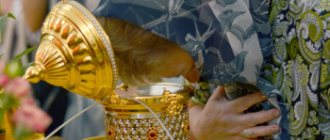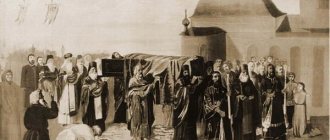Each day of the last week of Lent has its own meaning. But among them there is one that is filled with a special meaning. Maundy Thursday (Clean, Passionate, Maundy Thursday) - Thursday of Holy Week, when the Last Supper is remembered, at which Jesus Christ established the sacrament of the Eucharist (Holy Communion) and washed the feet of the disciples, as well as his prayer in the Garden of Gethsemane and the betrayal of Judas.
History of Maundy Thursday
The Last Supper
The Last Supper took place on the Day of Unleavened Bread - this is an Old Testament holiday that began on the 2nd day of Passover and lasted 7 days, during which the ancient Jews were not supposed to eat leavened food. On this day, according to the Old Testament law, it was customary to put the Passover lamb on the table. According to legend, it was on this day that the Savior from Heavenly Father was supposed to appear one day. Jesus Christ, who came to fulfill this law, sent Peter and John (his disciples) to Jerusalem to prepare Easter, which He had to replace with a new one - His body and blood. It was they who prepared the Zion upper room for the Last Supper.
- Last Supper
Jesus Christ with his disciples in the Zion upper room
When evening came, Jesus and his disciples came to the house of one Jerusalemite (his name is not mentioned), where a large bright upper room was already ready. There they began to have dinner. At the table He talked about the Kingdom of God, about how it is distinguished from earthly mortal existence by true love, humility and purity of spirit.
- Washing the disciples' feet
Jesus Christ washes the feet of his disciples.
After this, he got up from the table and washed the feet of his disciples, explaining his action. He commanded them from now on to do the same thing - not to disdain to wash each other’s feet.
- Establishment of the Sacrament of Holy Communion
Establishment of the Sacrament of the Most Holy Eucharist
After this, Jesus first celebrated Passover according to the Law of Moses, and then established a new one - the great sacrament of the Most Holy Eucharist (Communion).
- Continuation of the Last Supper
Christ gave salty bread to Judas Iscariot.
Continuing the Supper, the Lord predicted that one of the disciples would betray Him - the one to whom He gave bread and salt. And immediately He, dipping a piece of bread in salt, handed it to Judas Iscariot. It was through this piece that Satan entered him. Judas immediately left the Supper. It was already night. Jesus stopped the Apostles' dispute over primacy. He told them that it does not consist in domination and possession: “Whoever is the greatest among you, be like the younger, and the ruler like the servant.” He predicted to them the general temptation and threefold denial of Christ by Peter, as well as His appearance to them after the resurrection in Galilee.
- Prayer in the Garden of Gethsemane
Jesus' Prayer in the Garden of Gethsemane
After this, Jesus went with his disciples to the Garden of Gethsemane on the Mount of Olives. This is where His suffering began: first - mental, and then - physical. Anticipating them, the Lord said to the disciples: “Sit here while I go and pray there.” Taking with him Peter, James and John, who saw his transfiguration, he began to grieve and yearn. Having moved some distance away from them, He bowed his head and knees and prayed until he sweated blood, like a man during suffering, completely surrendering to the will of the Father. An angel from heaven appeared to Jesus and strengthened Him. During prayer, the Lord approached the disciples three times and asked them to pray with him. But they could not fulfill his request because they wanted to sleep.
- Betrayal of Judas
Kiss of Judas
Around midnight, Judas Iscariot came to the garden with armed men sent from the high priests and elders.
Jesus Himself came out to meet them, threw their enemies to the ground and humbly allowed the traitor to kiss Him. So the Lord, who demonstrated Divine omnipotence, who had legions of Angels in his power, came to offer Himself as a sacrifice for the sins of the world, voluntarily and humbly surrendered Himself into the hands of sinners.
Interpretation of the Holy Evangelist Matthew
As many now say: I would like to see the face of Christ, the image, the clothing! Behold, you see Him, you touch Him, you taste Him. You want to see His clothes, but He gives Himself to you and not only see, but also touch, taste, and take in. So, no one should approach with disdain, no one with cowardice, but all with fiery love, all with a warm heart and cheerfulness. If the Jews ate the lamb in haste, standing with boots on their feet and rods in their hands, then you should watch much more. They were preparing to go to Palestine, but you are preparing to go to heaven. Therefore, one must always be awake; no small punishment awaits those who partake unworthily. Think how indignant you are at the traitor and at those who crucified Christ. So, beware that you too do not become guilty against the body and blood of Christ. They put to death the all-holy body; and you accept him with an unclean soul after such great benefits. In fact, He was not content with merely becoming a man, being strangled and killed; but He still communicates Himself to us, and not only by faith, but also by deed itself makes us His body. How pure must one be who enjoys a bloodless sacrifice? How much purer than the rays of the sun should be - a hand crushing the flesh of Christ, a mouth filled with spiritual fire, a tongue stained with terrible blood! Think what an honor you have been awarded, what a meal you are enjoying! At the sight of what the Angels tremble, and what they do not dare to look at without fear, because of the radiance emanating from here, with this we are nourished, with this we communicate and become one body and one flesh with Christ. What kind of shepherd feeds the sheep with his own members? But what am I saying – shepherd? There are often mothers who give their newborn babies to other nurses. But Christ did not tolerate this, but Himself feeds us with His own blood, and through this unites us with Himself. Consider that He was born from your nature. But you will say: this does not apply to everyone. On the contrary, to everyone. If He came to our nature, then it is obvious that He came to everyone; and if to all, then to each individual. Why, you say, did not everyone benefit from this? This does not depend on the One who was pleased to do this for everyone, but on those who were not willing. He unites with every believer through the mysteries, and He Himself nourishes those whom He gave birth to, and does not entrust it to anyone else; and by this he again assures you that He has taken on your flesh. So, having received such love and honor, let us not indulge in carelessness. Do you not see with what readiness babies take their nipples, with what desire they press their lips to them? With the same disposition, we must approach this meal and suckle the spiritual cup, or better said, with even greater desire we must attract to ourselves, like breastfeeding babies, the grace of the Spirit; and we should have only one sorrow - the fact that we do not partake of this food. The actions of this sacrament are not performed by human power. The One who performed them then, at that supper, still performs them now. We take the place of ministers, and Christ himself sanctifies and transforms the gifts. Let there not be a single Judas here, not a single lover of money. If anyone is not a disciple of Christ, then let him leave; the meal does not admit those who are not such. This is the same meal that Christ offered, and nothing less. It cannot be said that this is done by Christ, and this by man; Christ himself does both. This place is the same upper room where He was with the disciples; From there they went out to the Mount of Olives. Let us also go out to where the hands of the poor are stretched out; this very place is the Mount of Olives; But the multitude of the poor are olive trees planted in the house of God, dripping with oil, which will be useful to us there, which five virgins had, and which, not taking, the other five perished. Having taken this oil, let us go in so that we can go out with burning lamps to meet the Bridegroom. Having taken this oil, let's leave here. Not a single inhumane, not a single cruel and unmerciful person, in a word - not a single unclean one, should approach here.
Divine service
On Maundy Thursday, the Liturgy of St. Basil the Great is celebrated in all churches.
On Maundy Thursday, the Liturgy of St. Basil the Great is celebrated in all churches. Due to the significance of the recalled event, it has a number of features:
- It is performed after Vespers (“full” liturgies are performed on Maundy Thursday, Maundy Saturday and the vespers of Christmas and Epiphany).
- Freshly brewed myrrh is blessed.
- After the liturgy, the ritual of “Washing the Feet” is performed. Today it is practiced only in cathedrals (the bishop washes the feet of 12 priests) and some monasteries.
- The throne is washed.
- Many Orthodox Christians try to take communion on this day.
- The common meal after the liturgy has a special status, so fasting is somewhat softened.
During the service, the prayer “ Thy secret supper this day, O Son of God, accept me as a partaker… ” is said several times. It is sung by everyone who is in the temple. In it, Christians ask God to make them partakers of the Last Supper, now taking place in the temple.
, the service of the Twelve Gospels is celebrated . She talks about the suffering and death of the Savior. These are excerpts from all the evangelists, divided into 12 readings - according to the number of hours of the night, which indicates that believers should spend the whole night listening to the Gospels, like the apostles who accompanied the Lord to the Garden of Gethsemane. The reading is preceded and accompanied by singing: “Glory to Your long-suffering, O Lord ,” and is also announced by the gospel with lighted candles.
- Troparion for Maundy Thursday, tone 8
When the glory of the disciple/ is enlightened at the supper,/ then the wicked Judas/ is darkened by the love of money,/ and betrays You, the Righteous Judge, to the lawless judges./ See, the riches of the race. to the teacher,/ who used strangulation for these sake!/ Flee, unsatiated souls,/ Such a teacher who has boldly; // Who is good in all, O Lord, glory to Thee.
- Kontakion for Maundy Thursday, tone 2
The traitor receives bread in his hand,/ he stretches it out in secret,/ and accepts the price of the hand of man who created his own,// and Judas the slave and flatterer remains uncorrected.
Holiday sermons
Every church rector at all levels addresses parishioners with a sermon on such Thursday. Here are two such sermons.
Sermon of Patriarch of Moscow and All Rus' Kirill
In his sermon, the Patriarch of Moscow calls this Thursday a special day on which the church remembers the events before, during and after the Last Supper. Patriarch Kirill notes the great many contradictions that nest in the human soul, and says that he heals the soul.
Sermon by Pope Francis
The Primate of the Roman Catholic Church, Pope Francis, noted in his sermon that human deeds speak louder than words and images. “We are different, with our own history, culture, faith, but we are all brothers and sisters,” Francis emphasized. “And everyone prays to our Lord Jesus Christ for this brotherhood.”
The meaning of Maundy Thursday
Confession and communion are intended to show the readiness of any Orthodox Christian to endure and forgive.
Tolerance, sincerity, compassion - this is the essence of this day, which is closely intertwined with the sacred meaning of the Passion of Christ. Confession and communion are intended to show the readiness of any Orthodox Christian to endure and forgive. The Body and Blood of Christ is an absolutely new reality. In it, God united with man so that man could unite with God. The sacrament is called Communion because in it we become partakers of the Divine.
In churches and cathedrals, services are held in purple festive attire. A relaxation of fasting is allowed: believers can sip wine. The meaning of all these actions is deep cleansing of the spirit and body, repentance and forgiveness. It is important that this day is recognized in all religions. The remaining 3 days until Easter are given to all of us to believe in the Savior Jesus Christ.
Traditions and customs
On Maundy Thursday, you must definitely visit the temple in order to understand the meaning of the celebration, take communion and listen to the Holy Scriptures
. On Maundy Thursday, you must definitely visit the temple in order to understand the meaning of the celebration, take communion and listen to the Holy Scriptures.
At the beginning of the Last Supper, Christ washed the feet of the disciples. Perhaps thanks to this, the tradition of cleaning houses and apartments on Maundy Thursday arose. But it is worth remembering that the essence of this day is not at all in cleaning the home, but in spiritual cleansing, repentance and preparing the soul for Holy Communion. It is necessary to restore order, but do it for the glory of the Almighty, without being distracted by the worldly. Housewives usually on this day not only clean the house, but also paint eggs, bake Easter cakes and prepare other dishes for the festive table.
Previously, cutting and washing were perceived as hard work - hence the desire to leave them completely on this day for the sake of praising the Heavenly Father.
The Church completely denies all conspiracies committed on Maundy Thursday. They belong to paganism and do not purify the consciousness, but burden the soul with grave sin.
In 2021, Maundy Thursday falls on April 16th. So don't forget to visit the temple on this day. For those who do not have this opportunity, pray at home, read the Gospel and remember the Last Supper and the events that took place in the Garden of Gethsemane.
Signs
Signs that came to us from the people. If you follow them, then good luck and prosperity will not leave you all year.
Here are the main ones:
- During spring cleaning, things are found that you no longer expected to find.
- By freeing yourself from old things on this day, you can get rid of need. To do this, you need to give your unnecessary clothes and shoes to the poor, then there will be prosperity all year.
- If you count all the money in the house on Thursday, you will be rich all year long. True, this must be done secretly so that no one sees.
- To sweep away all problems and ailments from the house, you need to clean the room from the farthest corners to the front door, and pour dirty water after washing the floors onto stones or onto the roadway.
- To complete the cleansing of soul and body, it is imperative to take communion.
Having become familiar with conspiracies and omens, you need to know that the Orthodox Church does not bless reading conspiracies and observing omens, considering this a sin of superstition. According to the Church, Maundy Thursday is a time for repentance of sins and Communion of the Mysteries of Christ.











